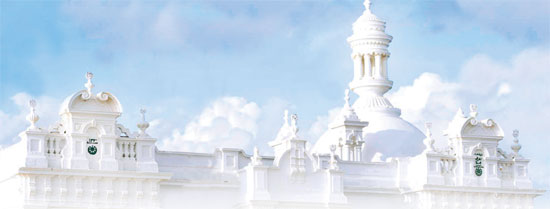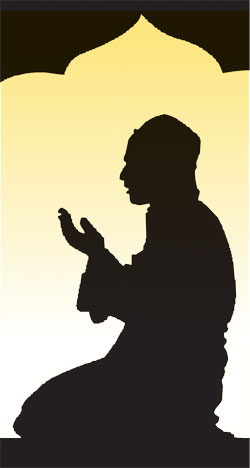Ramazan cleansing the soul
by Husna Inayathullah
“It was the month of Ramadan in
which was revealed the Qur’aan, a guidance for mankind and clear proof
for the guidance and the criterion between right and wrong.”
[al-Baqarah 2:185]
|

Ketchimalai Mosque, Sri Lanka’s oldest mosque in Beruwala |
Muslims around the world welcome the blessed month of Ramazan
tomorrow. They will fast every day from sunrise to sunset continuously
for a month. Fasting is one of the five pillars of Islam. Fasting during
this period is not simply about abstaining from food and water for 14
hours or so a day but is a month long spiritual journey that helps
purify the soul, refocus attention on God and practice self sacrifice.
The essence of fasting is reflected in the Arabic term ‘sawm’, which
literally means ‘to refrain’, not just from food and drink but in
actions, thoughts, words and deeds as well.
Revelation
Ramazan is the ninth month in the Islamic calendar and is significant
also because it was during this month that the first revelation of the
Quran was made to Prophet Mohammad. Fasting in the month of Ramazan was
made obligatory during the month of Sha’aban in the second year after
the Muslims migrated from Mecca to Medina. The month lasts for 29 to 30
days based on the sighting of the crescent moon.
The word ‘Ramazan’, also spelt ‘Ramadan’, comes from the Arabic root
ramida or ar-ramad, which means scorching heat or dryness. Fasting is
obligatory for adult Muslims except for those who are ill, travelling,
the elderly, pregnant, breastfeeding or menstruating. However, they are
expected to make up for the missed fasting days sometime in the future
or help feed the poor.
 While
fasting from dawn to sunset, Muslims refrain from consuming food,
drinking liquids, smoking and engaging in sexual intercourse. Muslims
also refrain from other behaviour that could be perceived as sinful such
as swearing, engaging in disagreements, and procrastination. Two main
meals are served during Ramazan, the ‘Suhoor’, which is served before
dawn and ‘Iftar’ which is served after sunset. Suhoor helps a Muslim to
fast and stay active and fit throughout the day. While
fasting from dawn to sunset, Muslims refrain from consuming food,
drinking liquids, smoking and engaging in sexual intercourse. Muslims
also refrain from other behaviour that could be perceived as sinful such
as swearing, engaging in disagreements, and procrastination. Two main
meals are served during Ramazan, the ‘Suhoor’, which is served before
dawn and ‘Iftar’ which is served after sunset. Suhoor helps a Muslim to
fast and stay active and fit throughout the day.
Prayers
Muslims around the world take a heavy and a hearty meal for Suhoor,
with fruit, milk and dates. Muslims begin to fast after Suhoor before
the sun rises or the morning prayers begin, which marks the end of the
Suhoor time. Each day’s fast is broken with a meal known as ‘Iftar’.
Traditionally, the fast is broken with dates and water. Iftar is often
an elaborate feast celebrated with family and friends.
During Ramadan, at the end of a day’s fasting, Muslims all over the
world sit cross-legged on the floor in mosques and at homes, waiting in
hunger, fatigue and devotion for the ‘Azan’, the call to prayer in
reverent preparation to break their fast. With Iftar, they can eat and
drink at any time until the next day’s Suhoor. Both Suhoor and Iftar
meals contain fresh fruit, vegetables, Halal meats, bread, cheese, and
sweets. Since Muslims live all over the world the types of food served
vary by region. The meals are served either at home with family, in the
community mosque or other designated places within the Muslim community.
Charity becomes very important especially during the Ramazan period.
The Arabic term ‘Zakath’, which means ‘poor-rate’ is one of the pillars
of Islam and it is obligatory upon all Muslims who have the means, to
give a fixed percentage of their income/savings to the poor during this
month.
Tarawih prayers are extra prayers performed by Muslims at night
during the month of Ramazan. They are not compulsory but Muslims believe
they can gain a lot of merit by observing these prayers, conducted at
the mosque for the duration of Ramazan. Whole sections of the Quran are
recited during these prayers, ensuring that the entire Quran is
completed when the month of fasting ends. Incidentally, Tarawih prayers
are one of the few exceptions where Muslim women are accommodated in the
mosques.
 The
spiritual significance of the month reaches its pinnacle on the night of
the 27th day of fasting, the night on which, Muslims believe the first
revelation of the Quran was sent to Prophet Mohammed. The
spiritual significance of the month reaches its pinnacle on the night of
the 27th day of fasting, the night on which, Muslims believe the first
revelation of the Quran was sent to Prophet Mohammed.
Holiest
Referred to as Laylatul Qadr, which means ‘the night of power’, it is
considered the holiest night of the year.
There is some controversy about the exact night on which the Quran
was first revealed, with most Muslims believing it to have occurred on
an odd numbered night during the last ten days of the Ramazan month. But
as a general consensus, the 27th night is accepted as spiritually
special with a majority of the Muslims engaging in devotional activity
throughout the night to receive the Mercy of God.
|

Muslims begin to fast after Suhoor before the sun rises or
the morning prayers begin, which marks the end of the Suhoor
time. Each day’s fast is broken with a meal known as ‘Iftar’.
Traditionally, the fast is broken with dates and water.
Iftar is often an elaborate feast celebrated with family and
friends. |
Eid-ul-Fitr, which means ‘the festival of breaking fast’ marks the
end of Ramazan and the beginning of the next lunar month, known as
Shawwal. The first day of the month is declared after another crescent
new moon is sighted.
Festival
The Muslims are very excited to see the new moon to begin celebrating
the festival. Eid ul-Fitr is a happy, festive time, with Muslims, having
endured the month of fasting successfully, then return to the normal
routine of everyday living. Muslims greet each other by saying “Eid
Mubarak”.
Fasting is a good practice if properly observed and is said to have
many health benefits including helping promote healthy eating habits and
boosting immunity.
Fasting also enables detoxification, give some respite to the
digestive system, resolve inflammatory responses, reduce blood sugar,
increase fat breakdown, correct high blood pressure, control diabetes,
promote weight loss and overcome addictions.
“Allaah has made Laylat al-Qadr in this month, which is better than a
thousand months, as Allaah says...The Night of Al-Qadr is better than a
thousand months. Therein descend the angels and the Rooh [Jibreel
(Gabriel)] by Allaah’s Permission with all Decrees, there is peace until
the appearance of dawn.” ~ [al-Qadar 97:1-5]
Zain Malik -
An accountant
We should feel gratitude for the bounties of God such as clean water, sufficient
healthy food, comfort of a home and health of our family members. There are so
many in the world who survive without these basic needs, and Ramadan is a time
for us to give thanks and reaffirm our commitment to helping those in need.
Rizana Sheriffdeen -
A teacher
Ramadan is a month filled with happiness and joy. It is a spiritual month to
engage in good activities as a family. As a mother, it is a great pleasure for
me to see my family devoting themselves to God. This holy month brings blessings
to my family.
Zainiya Ali - A student
When I fast, I feel hungry, but while fasting when I give someone Zakath from my
hand and when they feel happy, it really fills my heart. I am happy that I am
able to help someone. Fasting for 30 days and waiting eagerly for the festival
is cool. I love purchasing new clothes to wear to the mosque on festival day.
Going to the mosque early in the morning to pray festival prayers is exciting.
Meeting friends and greeting them is also cool.---
Mohammed Ali -
A businessman
This month brings a great delight for me because it is the time of the year
where all Muslims get together in the nights for Tarawih prayers and engage in
spiritual activities. The month of Ramadan bestows good health and wealth upon
us.
Aaisha Haleem - A student
I am nine years old. I couldn’t fast the whole day at the beginning and I felt
like fasting just because everyone at home did. My mother used to narrate a
story about a poor boy long ago, who did fasting and died, but again got life
through an angel due to the blessings of Allah. My mother’s stories made me
fast. I like to fast but sometimes I feel tired. I hope this year I can fast
well and all 30 days.
Shimra Gafoor -
A housewife
I love Ramazan as it is one of the five pillars of Islam. Allah has given
everyone a chance to find forgiveness in the month of Ramazan. Fasting help us
experience the hunger faced by the poor people and beggars. I always feel and
realize how people suffer without food and water. Ramazan is the month where we
can do lots of good deeds. |

